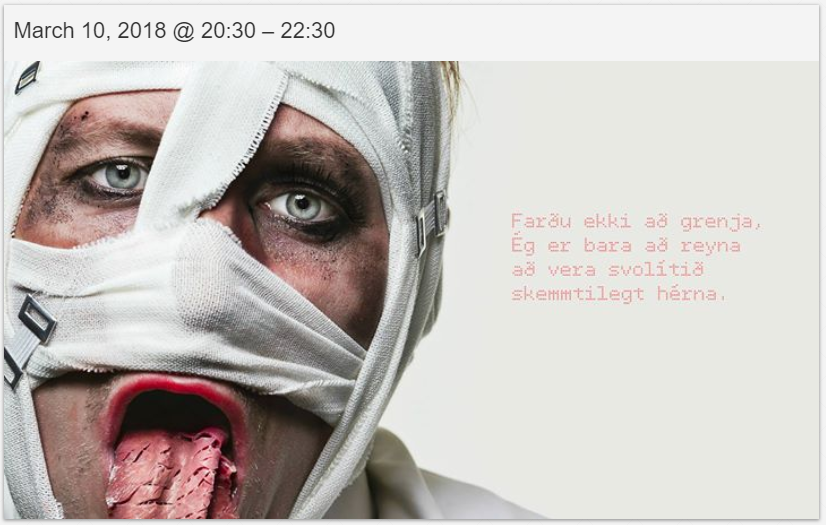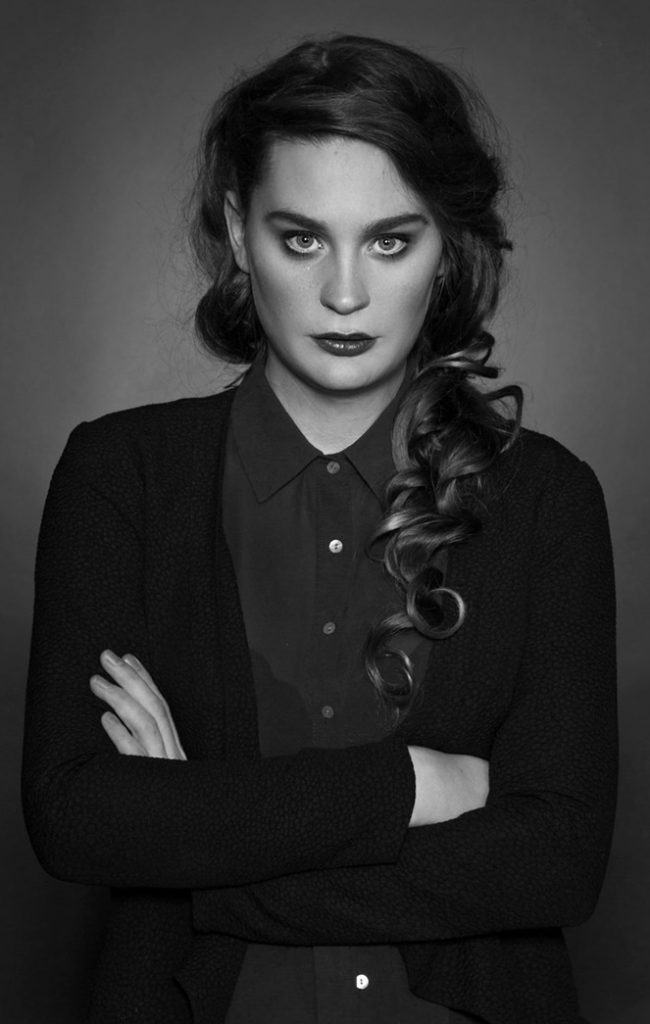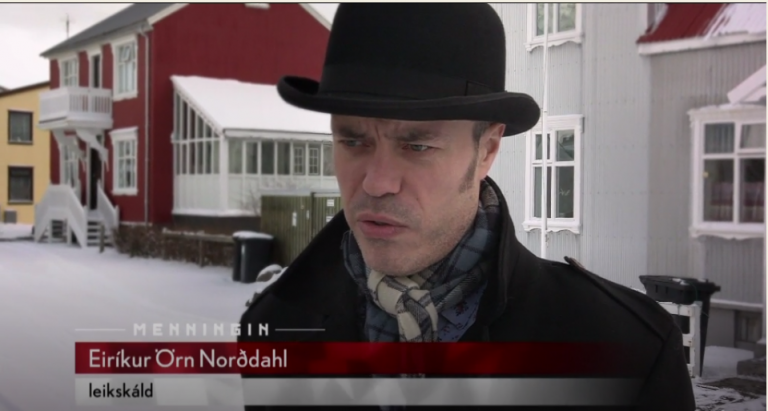Playwright of “controversial” play responds to criticism.

GayIceland contacted the author of Hans Blær, Eiríkur Örn Norðdahl to get his response to Ugla’s point of view and started by asking Eiríkur why he had decided to make the protagonist a non binary person.
“To begin with it’s hard to say that things are strictly decided in a creation that you work on instinctively,” says Eiríkur. “I don’t want to deny any responsibility for this creation – obviously I decided not to throw the piece into the trash but follow it up, pick up the threads that I saw in it. Ideas like this one come from numerous directions – I’ve admired trans people for their courage for a long time and they have held a place in my mind. What I wanted to do when Hans Blær came into being – three years ago – was, among other things, to create an individual that was like the complete contradiction, in a mad conflict with themselves and society. I found that place in a blend of monster and angel, loser and hero – they are at the same time everything they are and everything they are not and challenge their own definitions every step of the way. I found that a fertile place to work with. Maybe it was a terrible idea – I’m not always really sure.”
“Having a discussion about prejudice it’s inavoidable to point out that it’s a bit off to condemn a work that you have not seen so harshly – I had not even seen it myself when people started sending me notes and comments on it.”
Hans Blær is not only the protagonist in the play, Eiríkur is also finishing a novel about Hans and he says that he has a hard time separating the two works.
“I’m tackling many questions in this play – and even more questions in the novel that will be published this autumn. Having a discussion about prejudice it’s inavoidable to point out that it’s a bit off to condemn a work that you have not seen so harshly – I had not even seen it myself when people started sending me notes and comments on it. Having said that I find it in many ways uncomfortable to defend the play. To begin with the emphasis it lays and it’s estetics is largely the work of the theatre group and secondly for me, which am first and foremost a novelist, not a playwright, the novel is the ultimate product. Thirdly I find my self pointing to the novel again and again to explain all sorts of things in the play, which is of course a hopeless avoidance – the book has not been published yet, this is the play’s moment, but obviously my head is stuck in the world of the novel, which I am finishing after three years of struggle.”
One of the words, used in the interview is “transi”, which trans people experience in the same way that a black person experiences the use of the word “negro”. Did you collaborate with any trans or non binary person when you were writing to get insight into the reality that they live in?

“I’ve been having trouble with this word. I’ve used it in my interactions with trans people and trans people have used it to me, so it’s obviously widely used without any malice. I saw somewhere that it was a translation of the English word “trannie” – which is considered degrading, but that, of course, is in a foreign context.
Having said that I’m not really keen on hurting people with the words I choose, it’s not my intention to be a bigger fool than I need to be. I do know a fair amount of trans people – which I don’t want to use as some kind of an alibi, though I have mentioned the piece to some of them – and I have not consulted many people when writing the piece and none of them have been trans. I have, on the other hand read a lot about the issue – my non binary and intersex library is getting quite presentable.
That’s just how I work – alone, in my solitude, I’m in many ways unsociable and nervous. I didn’t consult any Lithuanians or jews either when I was writing Illska, or muslims when writing Gæska nor any women who had lost a child when I wrote Eitur fyrir byrjendur. I’m not sure I could ever write anything if I worked like that. I would probably just sit paralysed the whole day. If my novels and plays are worse – unreadable trash – because of that approach, so be it.”
Hans Blær is the first Icelandic work that has a non binary protagonist and the queer community is not happy about them being presented as some kind of “phenomenon”, as the director put it in this interview on tv. Were you not ready for queer people to get this angry by that presentation of the character?
“Hans Blær is a phenomenon, a freak by it’s own choice and I don’t know how I could describe them otherwise. They are not a phenomenon because they are trans but besides being trans . A person can be more than one thing, a person can be many things at the same time, a person can be one thing today and another thing tomorrow – every one of us is a multitude of things and we are constantly contradicting ourselves.
“I’m not really keen on hurting people with the words I choose, it’s not my intention to be a bigger fool than I need to be.”
Having said that, I’m not the right person to answer for the director or how the TV show presented the play. Because we are obviously talking about a piece that no one here has seen yet, except myself. And honestly – from the bottom of my heart – I really do not want to defend the play, explain it or interpret it. It crossed my mind right from the beginning, before this interview on TV, to say nothing at all about the play – just let it exist in the world without any interference, like a giant question mark or a thorn in the side. But that is not really possible, of course. The present time is in such a hurry to put everything in some box, reach a conclusion – should we condemn or praise, applaud or throw eggs? – because the world is meant to be a continuous entertaining act and everyone who betrays that contract is plainly guilty. But I think I will never the less keep quiet for the next few months and let the piece speak, the people who have seen it interpret it, and then wait for the novel.”
Main photo: Eiríkur Örn Norðdahl has caused quite a stir in the Icelandic queer community with his new play. Photo / A screenshot from an interview with Eiríkur on RÚV.
___________________________________________________________________________________________________
Eiríkurs reply in Icelandic:
Hvers vegna ákvaðstu að hafa Hans Blæ kynsegin?
„Í fyrsta lagi er erfitt að tala um það í sköpun sem er unnin instinktíft að hlutir séu beinlínis ákveðnir. Ég vil ekki hafna neinni ábyrgð á þessari tilvist – ég ákvað augljóslega ekki að henda verkinu í ruslið heldur fylgja því eftir, draga upp þræðina sem ég rak augun í. Hugmyndir einsog þessar spretta síðan úr ótal áttum – ég hef lengi dáðst að transfólki fyrir hugrekki sitt og þau hafa átt sess í huga mér. Það sem fyrir mér vakti þegar Hans Blær varð til – fyrir um þremur árum – var meðal annars að skapa einstakling sem einsog hin fullkomna mótsögn, í brjálæðislegri togstreitu við sjálfan sig og samfélagið. Ég fann þann stað í blöndu af skrímsli og engli, aumingja og hetju – hán er í senn allt sem hán er og allt sem hán er ekki og ögrar eigin skilgreiningum í hverju skrefi. Mér fannst það frjór staður til að vinna með. Kannski var það skelfileg hugmynd – ég er hreinlega ekki alltaf viss.
Tekist er á við margar þessara spurninga í leikritinu – og enn fleiri í skáldsögunni, sem er væntanleg í haust. Í samræðu um fordóma verður ekki hjá því komist heldur að nefna að það er dálítið off að fordæma svona harðlega verk sem maður hefur ekki séð – ég hafði ekki einu sinni séð það sjálfur þegar fólk byrjaði að senda mér nótur og athugasemdir. Að því sögðu finnst mér að mörgu leyti óþægilegt að verja leikverkið. Í fyrsta lagi eru áherslur þess og fagurfræði að miklu leyti leikhópsins og í öðru lagi er skáldsagan, fyrir mér sem er fyrst og fremst rithöfundur fremur en leikskáld, hin endanlega pródúkt. Í þriðja lagi stend ég mig ítrekað að því að vísa til hennar, til útskýringar á einu og öðru, og það eru auðvitað gersamlega glötuð undanbrögð – bókin er ekki komin út, þetta er augnablik leikritsins, en eðli málsins samkvæmt er hausinn á mér allur í heimi skáldsögunnar, ég er að klára hana eftir þriggja ára glímu.“
Eitt af þeim orðum sem notuð voru í viðtalinu var “transi” sem transfólk upplifir á sama hátt og svart fólk upplifir orðið “negri” varstu í samvinnu við einhverja trans eða kynsegin manneskju við samningu verksins til að kynnast veruleika trans/kynsegin fólks?
„Ég hef verið í vandræðum með þetta orð. Ég hef notað það í samskiptum við transfólk, vandræðalaust, og transfólk hefur notað það við mig, og það er í reglulegri notkun víða án nokkurs illvilja Einhvers staðar hef ég séð talað um það sem þýðingu á enska orðinu „tranny“ – sem þykir niðrandi, en það er auðvitað erlent samhengi. Að því sögðu er mér ekkert sérstakt markmið að særa fólk með orðavali mínu, það vakir ekki fyrir mér að vera meira fífl en ég þarf að vera. Ég þekki eitthvert slangur af transfólki – sem ég kæri mig samt ekki um að nota sem einhvers konar fjarvistarsönnun, þótt ég hafi nefnt verkið við sum þeirra – og ég hef ráðfært mig við afar fáa um samningu verksins, og hvorugt þeirra er trans. Ég var ekki einu sinni í sérstaklega miklum samskiptum við leikhópinn um leikgerðina heldur gaf þeim frjálsar hendur. Ég hef hins vegar lesið mér mikið til – kynsegin og intersexbókasafnið mitt (og nettröllabókasafnið mitt) er að verða ansi frambærilegt. Þannig vinn ég bara – í einrúmi, í minni einrænu, ég er að mörgu leyti félagsfælinn og taugaveiklaður. Ég ráðfærði mig ekki heldur við litháa eða gyðinga þegar ég vann að Illsku eða múslima þegar ég vann að Gæsku eða konur sem hafa orðið fyrir barnsmissi þegar ég skrifaði Eitur fyrir byrjendur. Ég er ekki viss um að ég gæti skrifað neitt ef ég starfaði þannig – ég sæti sennilega bara stjarfur allan daginn. Ef bækur mínar og leikrit eru verri fyrir vikið – ólæsilegt rusl – verður bara að hafa það.“
Þetta er fyrsta íslenska verkið þar sem aðalpersónan er kynsegin og þau eru mjög ósátt við að hán skuli vera eitthvert “fyrirbæri” eins og Vignir orðaði það í viðtalinu, áttirðu ekki von á því að kynsegin fólk myndi reiðast yfir þessari framsetningu á persónunni?
„Hans Blær er fyrirbæri, fenómen, sjálfskipað frík og ég veit ekki hvernig ætti að lýsa hánum* öðruvísi. Hán er ekki fyrirbæri vegna þess að hán sé trans heldur auk þess að vera trans. Maður getur verið fleira en eitt og maður getur verið margt í einu og maður getur verið eitt í dag og annað á morgun – og hvert og eitt okkar inniheldur mergðir, einsog skáldið kvað, og er í viðstöðulausri mótsögn.
Að því sögðu er ég auðvitað ekki maðurinn til að svara fyrir Vigni – eða framsetningu Kastljóss á verkinu. Því við erum auðvitað ekki að tala um verk sem neinn hérna hefur séð, að mér undanskildum – það er ein sýning búin og næsta er ekki fyrren í apríl. Og í raun og veru – svona alveg innst frá hjartarótum – kæri ég mig alls ekki um að verja verkið, skýra það eða túlka. Það hvarflaði alveg að mér alveg frá upphafi, fyrir Kastljósinnslagið, að neita bara að segja um það eitt einasta orð – að leyfa því bara að vera til í heiminum án afskipta, einsog risavaxið spurningamerki eða fleinn. En svo er það auðvitað ekki beinlínis hægt. Samtímanum liggur svo á að koma öllu fyrir í einhverju boxi, komast að niðurstöðu – á að fordæma eða hampa, klappa eða kasta eggjum? – af því heimurinn á allur að vera eitt viðstöðulaust meinlaust skemmtiatriði og allir sem svíkja þann samning eru einfaldlega sekir. Ég held ég þegi samt næstu mánuðina og láti verkið um að tala, þá sem hafa séð verkið um að túlka, og bíði svo bókarinnar.“
* Hans Blær er sjálft í svo miklu trássi við heiminn að hán beygir fornafnið einsog hánum/hán sýnist, til að aðgreina sig. Ég biðst forláts fyrir hánar/háns hönd.


